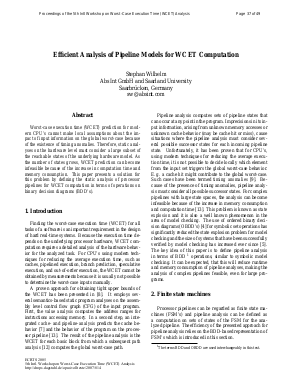Efficient Analysis of Pipeline Models for WCET Computation
Author Stephan Wilhelm
-
Part of:
Volume:
5th International Workshop on Worst-Case Execution Time Analysis (WCET'05) (WCET 2005)
Part of: Series: Open Access Series in Informatics (OASIcs)
Part of: Conference: Workshop on Worst-Case Execution Time Analysis (WCET) - License:
 Creative Commons Attribution-NonCommercial-NoDerivs 3.0 Unported license
Creative Commons Attribution-NonCommercial-NoDerivs 3.0 Unported license
- Publication Date: 2007-03-29
File

PDF
OASIcs.WCET.2005.814.pdf
- Filesize: 283 kB
- 4 pages
Document Identifiers
Subject Classification
Keywords
- Worst-case execution time prediction
- pipeline analysis
- timing anomalies
- binary decision diagrams
Metrics
- Access Statistics
-
Total Accesses (updated on a weekly basis)
0Document
0Metadata
Abstract
Worst-case execution time (WCET) prediction for modern CPU’s cannot make local assumptions about the impact of input information on the global worst-case because of the existence of timing anomalies. Therefore, static analyses on the hardware level must consider a large subset of the reachable states of the underlying hardware model. As the number of states grows, WCET prediction can become infeasible because of the increase in computation time and memory consumption. This paper presents a solution for this problem by defining the static analysis of processor pipelines for WCET computation in terms of operations on binary decision diagrams (BDD’s).
Cite As Get BibTex
Stephan Wilhelm. Efficient Analysis of Pipeline Models for WCET Computation. In 5th International Workshop on Worst-Case Execution Time Analysis (WCET'05). Open Access Series in Informatics (OASIcs), Volume 1, pp. 37-40, Schloss Dagstuhl – Leibniz-Zentrum für Informatik (2007)
https://doi.org/10.4230/OASIcs.WCET.2005.814
BibTex
@InProceedings{wilhelm:OASIcs.WCET.2005.814,
author = {Wilhelm, Stephan},
title = {{Efficient Analysis of Pipeline Models for WCET Computation}},
booktitle = {5th International Workshop on Worst-Case Execution Time Analysis (WCET'05)},
pages = {37--40},
series = {Open Access Series in Informatics (OASIcs)},
ISBN = {978-3-939897-24-8},
ISSN = {2190-6807},
year = {2007},
volume = {1},
editor = {Wilhelm, Reinhard},
publisher = {Schloss Dagstuhl -- Leibniz-Zentrum f{\"u}r Informatik},
address = {Dagstuhl, Germany},
URL = {https://drops.dagstuhl.de/entities/document/10.4230/OASIcs.WCET.2005.814},
URN = {urn:nbn:de:0030-drops-8149},
doi = {10.4230/OASIcs.WCET.2005.814},
annote = {Keywords: Worst-case execution time prediction, pipeline analysis, timing anomalies, binary decision diagrams}
}
